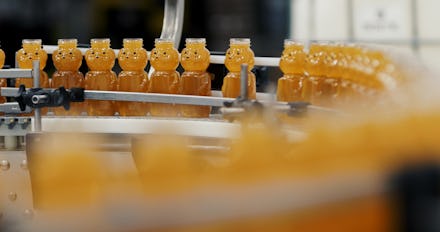If you liked ‘Making a Murderer,’ you’ll love Netflix’s new docuseries on corruption in food

You don’t have to be obsessed with Michelin-starred restaurants to enjoy Netflix’s new docuseries about food. Rotten, which is available to stream on Jan. 5, takes a critical look at corruption in the food industry.
Produced by Zero Point Zero, the production company behind Anthony Bourdain’s No Reservations and Parts Unknown, the six-part series takes on a new and different angle in each episode, so viewers don’t need to watch them in any particular order. From greedy thieves stealing honeycombs to a “David and Goliath” fight for consumers in the garlic industry, the series shines a spotlight on the downright bizarre stories that shape what ends up in our grocery carts and on our plates.
The first episode, called “Lawyers, Guns and Honey,” explores the global honey business, problems with honeybees and corruption in the industry. Cinematic shots of flying bees, luscious honeycombs and bustling honey production facilities provide an eye-catching backdrop to the unsavory tale that unfolds. Viewers learn how cheap imports of honey tainted the U.S. supply in a scandal known as “honeygate.”
Streaming these episodes isn’t as mouthwatering as watching Top Chef or Chef’s Table, but Rotten is mesmerizing in a different way. The camera pans over streams of honey filling up plastic bear-shaped containers, green fields of garlic and other hypnotizing shots.
The producers also drop trivia — about nutrition, food waste and more — that might surprise the average viewer. In the first episode, the voiceover notes that honey isn’t necessarily any healthier than other sugars.
“The reality is that our bodies process honey more or less the same way they process other sugars,” the voiceover says. “Food makers looking to please picky consumers have switched from sugar to honey to sweeten dozens of products.”
Rotten has many of the themes true crime aficionados crave — greed, robbery, violence — but the series doesn’t feel quite as addictive as gotta-binge series like Making a Murderer or The People vs. O.J. Simpson: American Crime Story. And that’s probably because viewers don’t really get an intimate view of the people who are perpetrating the food fraud. You won’t feel the same sympathy you might have felt for convicted murderer Steven Avery in Making a Murderer. But you might feel confused, duped and maybe angry with the food industry, much like how Murderer showcased unfairness in the justice system.
Overall, the strength of Rotten isn’t in the content — most Americans already know that there’s an exhausting list of foods with supply chains that are morally squishy — but the storytelling itself. The series doesn’t strike a preachy tone; it succeeds by showing how nuanced and complicated the global food supply chain can be — without making you feel guilty for loving food.